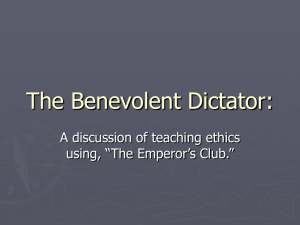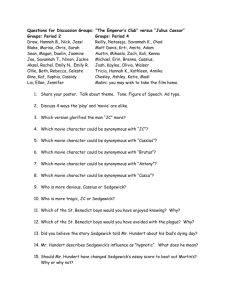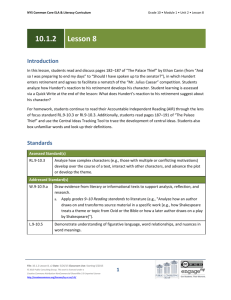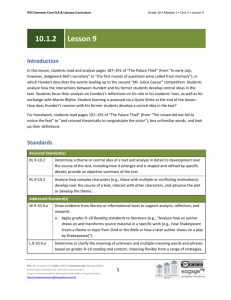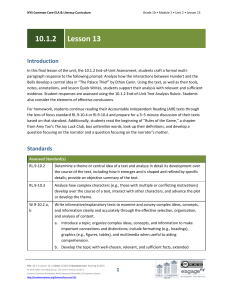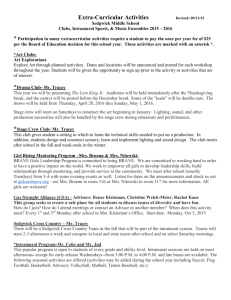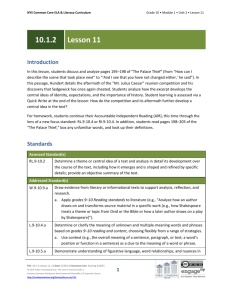File - William Quillen
advertisement
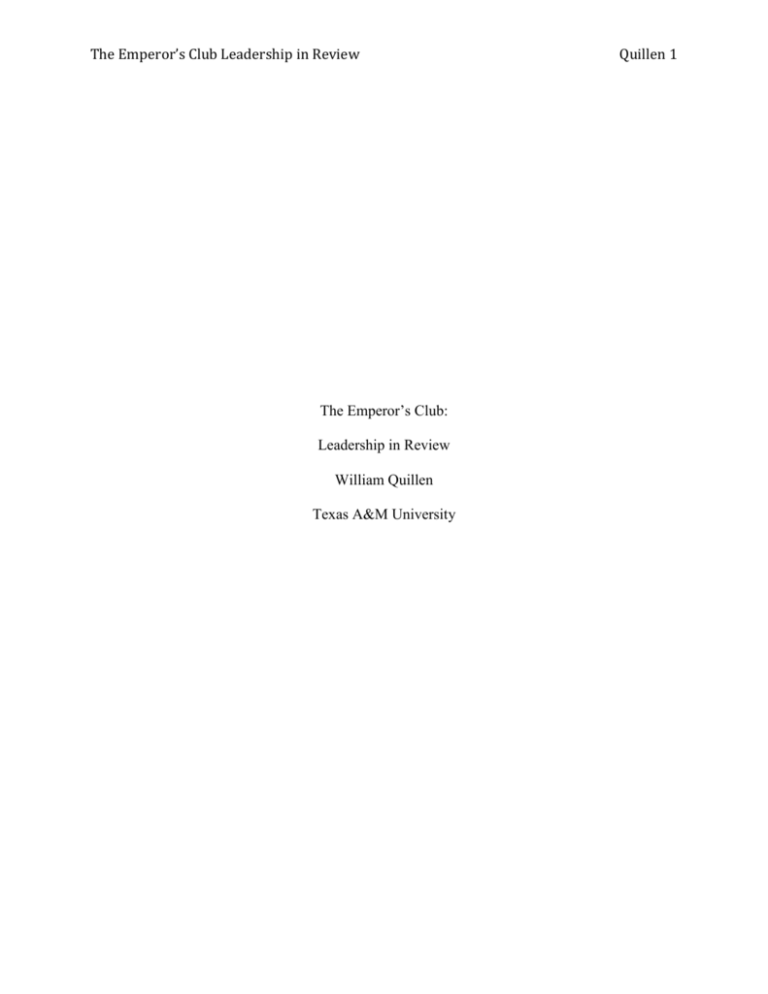
The Emperor’s Club Leadership in Review The Emperor’s Club: Leadership in Review William Quillen Texas A&M University Quillen 1 The Emperor’s Club Leadership in Review Quillen 2 The Emperor’s Club: Leadership in Review The Emperors Club is a 2002 film about a professor and his class of freshmen students from 1972. William Hundert is a passionate and conscientious professor of Western Civilization who finds his very disciplined and controlled world shaken by the arrival of a new student, Sedgwick Bell. This relationship begins with a fierce battle of wits and wills which gives way to a close student-teacher relationship. But, ultimately results in a life lesson for Professor Hundert that will haunt him for the rest of his teaching career. Once passed up for Headmaster after seventeen years as the Assistant Headmaster Mr. Hundert decides to tenure his resignation. He then decides he wants to write a book yet he can’t find the inspiration to begin writing. He then receives and invitation to re-administer the Mr. Julius Caesar competition. This is where the final lesson for Mr. Bell takes place twenty-five years after the initial incident that put their relationship to the test. Once Mr. Hundert catches Sedgwick cheating again he offer him one last lesson on honor and integrity. There are two major leaders in the movie that have contrasting personalities and leadership styles. Mr. Hundert receives significantly less character development in the movie. The reason for this is because he is the teacher trying to teach his students the significance of honor and integrity. Mr. Hundert feels it is his responsibility to mold his students into young men of high moral standing and great character. According to Northouses’ Big Five Mr. Hundert would be a Conscientious leader. This is one who focuses on a tendency to be thorough, organized, controlled, dependable, and decisive (Northouse, 22). He was a very dedicated teacher to his students. One thing he told them in the beginning of the movie that challenged them was; “Great ambition and conquest without contribution is without significance. What will The Emperor’s Club Leadership in Review Quillen 3 your contribution be? How will history remember you?” (Canin & Hoffman). This is one example of how he challenges his students to make the most of them. The other major character that exemplifies a different form of leadership quality than Mr. Hundert is Sedgwick Bell. He is a loud-mouthed arrogant student who challenges everything that Mr. Hundert tries to instill into his students. In my opinion according to the Big 5 as outlined in Norhthouse Sedgwick would be a combination of neuroticism and extraversion. The reason for this is while he is a sociable, assertive individual he also I believe has some type of insecurities about him. A perfect example of this is at the end of the video when he makes this statement to Mr. Hundert “I live in a real world where people do what they need to do to get what they want. If it is lying, if it is cheating, then so be it” (Canin & Hoffman). This is a perfect example of how Sedgwick goes against the grain of the values, morals, and character molding that Mr. Hundert is trying to do with his students. Mr. Hundert is a perfect example of a transformational leader. A transformational leader as defined by Northouse is the process whereby a person engages with others and creates a connection that raises the level of motivation and morality in both the leader and the follower (Northouse, Chap. 9). This is very evident again in the movie when he asks Sedgwick if he can offer him one final lesson. This is all done after he is caught cheating for the second time. He tells Sedgwick that at some point were all forced to look into the mirror and see who we really are. He continues to say that he will be confronted with a life lived without virtue and without principal. He feels that he has failed Sedgwick because that he has learned nothing form the four long years with Mr. Hundert. Mr. Hundert is a Theory Y leader. He is this because he wants to see his organization succeed, makes his own decisions, he is trusted, and he is motivated by interesting and The Emperor’s Club Leadership in Review Quillen 4 challenging tasks. These are evident when he applies for the Headmaster position. A position that he has been the Assistant Headmaster for seventeen years while also serving as a teacher of the Classics the Greeks and the Romans. Mr. Hundert does his best to instill in his students that hard work ethic, good moral standing, and strong character that he has. He does this because he knows that with these things you can succeed at anything you do. Yet, again we see Sedgwick challenging everything that Mr. Hundert tries to instill into him. When one looks at the Path-Goal Theory of Leadership you four distinct leadership styles within it Mr. Hundert would be considered a supportive leader. He is this because he takes a special care for his student. You can see this all throughout the movie. Yet the most obvious place is when Mr. Hundert speaks with Senator Bell (Sedgwick’s Father). In this discussion Mr. Hundert: “Sir, it's my job to mold your son's character, and I think if...” In response to this Senator Bell states: “ Mold him? Jesus God in Heaven, son. You're not gonna mold my boy. Your job is to teach my son. You teach him his times tables. Teach him why the world is round. Teach him who killed who and when and where. That is your job. You, sir, will not mold by son. I will mold him.” (Canin & Hoffman). In this discussion you can see that Mr. Hundert wants to become a major role model in these students lives. Yet, once he is told this you would think he would not interfere with Sedgwick’s character molding. Yet, he still tries to get through to him. One would even say he tries even harder at this point because he realizes that Sedgwick’s father lacks the good virtues and moral character that he feels Sedgwick needs to succeed. One can learn a lot from Mr. Hundert especially if they plan on going into the education field such as myself. There are several things that I took away form this movie while looking deeper into it. One, thing that I learned was that it is important to take a special interest in all your student no matter how much of a lost cause you feel they are. At the same time you also The Emperor’s Club Leadership in Review Quillen 5 learn something from this quote at the end of the movie that Mr. Hundert’s students get engraved into a plaque for him. “A great teacher has little external history to record. His life goes over into other lives. These men are pillars in the intimate structure of our schools. They are more essential than its stones or beams, and they will continue to be a kindling force and a revealing power in our lives.” (Canin & Hoffman). From this quote a teacher realizes that their mark on history is not made externally as stated in the quote. However it is measured by the quality of student that the teacher produces. In soaking with many different teachers they hope they can reach all students yet they know that there are always those few that slip through and learn no life lessons and don’t exactly succeed, as the teacher would’ve hoped. After looking into Mr. Hundert and considering his leadership styles. I feel that I can learn a great deal about the types of leadership required to become a great teacher. Yet one must be careful and not become the type of teacher that has a negative influence on students. Teachers are leaders all the time and can never falter in their ethics, moral character, or virtues. Mr. Hundert did this and it haunted him for the next twenty-five years. Only when he admitted to Mr. Blythe did he feel some type of closure. The Emperor’s Club Leadership in Review Quillen 6 References Northouse, P. G.. (2010). Leadership. (Vol. 5th Edition, Ed.). Thousand Oaks, CA: SAGE. Canin, Ethan (Writer), & Hoffman, Michael (Director). (2002). The Emperor’s Club [movie]. Universal Studios Williams, J. R. (2010). Course notes: ALED 340-Professional Leadership Development. College Station, TX: Texas A&M University.
